Mises, Ludwig von. Human Action: A Treatise on Economics
Подождите немного. Документ загружается.

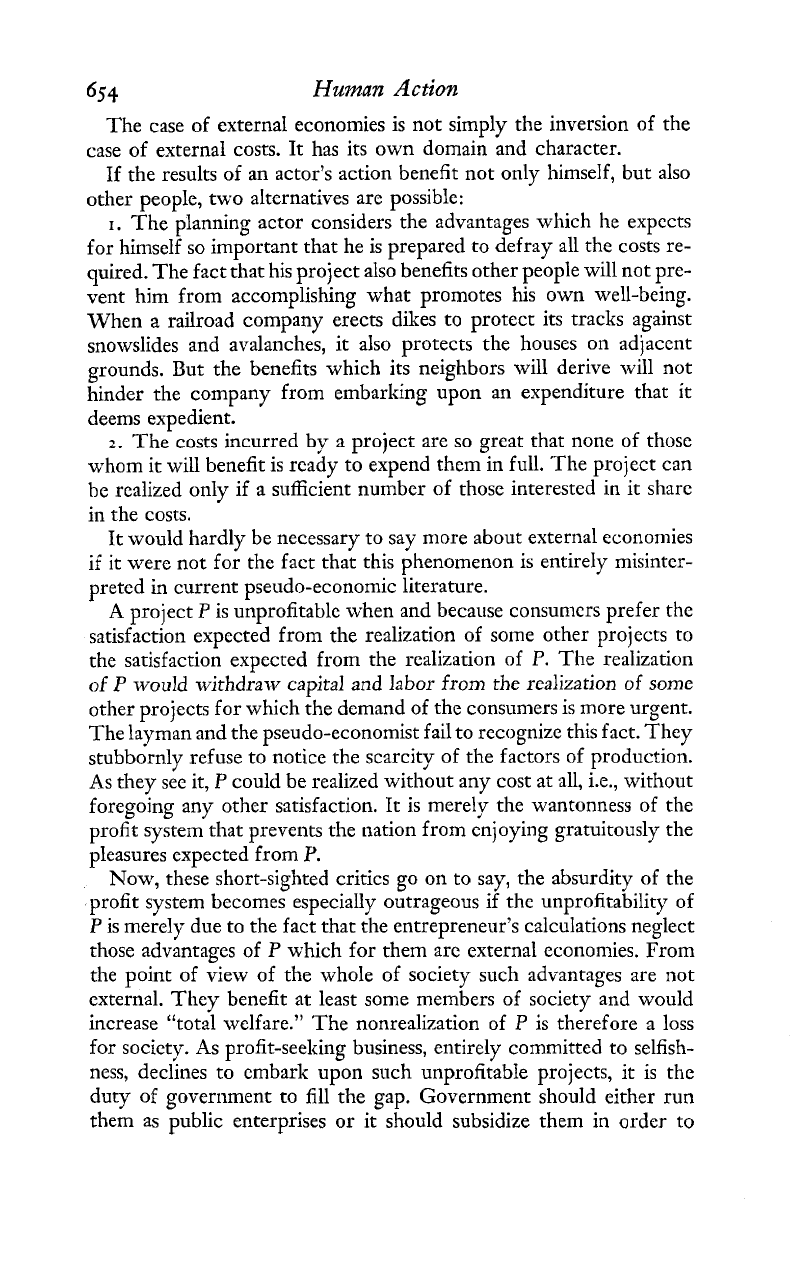
654
Human
Action
The case of external economies is not simply the inversion of the
case of external costs. It has its own domain and character.
If the results of an actor's action benefit not only himseIf, but also
other people, two alternatives are possible:
I.
The planning actor considers the advantages which he expects
for himself so important that he is prepared to defray all the costs re-
quired. The fact that his project also benefits other people will not pre-
vent him from accomplishing what promotes his own well-being.
When a railroad company erects dikes to protect its tracks against
snowslides and avalanches,
it
also protects the houses on adjacent
grounds. But the benefits which its neighbors will derive will not
hinder the company from embarking upon an expenditure that it
deems expedient.
2.
The costs incurred by a project are so great that none of those
whom it will benefit is ready to expend them in full. The project can
be realized only if a sufficient number of those interested in it share
in the costs.
It would hardly be necessary to say more about external economies
if it were not for the fact that this phenomenon is entirely misinter-
preted in currcnt pseudo-economic literature.
A project
P
is unprofitable when and because consumers prefer the
satisfaction expected from the realization of some other projects to
the satisfaction expected from the realization of
P.
The realization
of
P
would
withdraw capital and
labor
from the realization
of
some
other projects for which the demand of the consumers is more urgent.
The layman and the pseudo-economist fail to recognize this fact. They
stubbornly refuse to notice the scarcity of the factors of production.
As they see it,
P
could be realized without any cost at all, i.e., without
foregoing any other satisfaction. It is merely the wantonness of the
profit system that prevents the nation from enjoying gratuitously the
pleasures expected from
P.
Now,
these short-sighted critics go on to say, the absurdity of the
profit system becomes especially outrageous if the unprofitability of
P
is merely due to the fact that the entrepreneur's calculations neglect
those advantages of
P
which for them are external economies. From
the point of view of the whole of society such advantages are not
external. They benefit at least some members of society and would
increase "total welfare." 'The nonrealization of
P
is therefore a loss
for society. As profit-seeking business, entircly committed to selfish-
ness, declines to embark upon such unprofitabIe projects, it is the
duty of government to fill the gap. Government should either run
them as public enterprises or it should subsidize them in order to
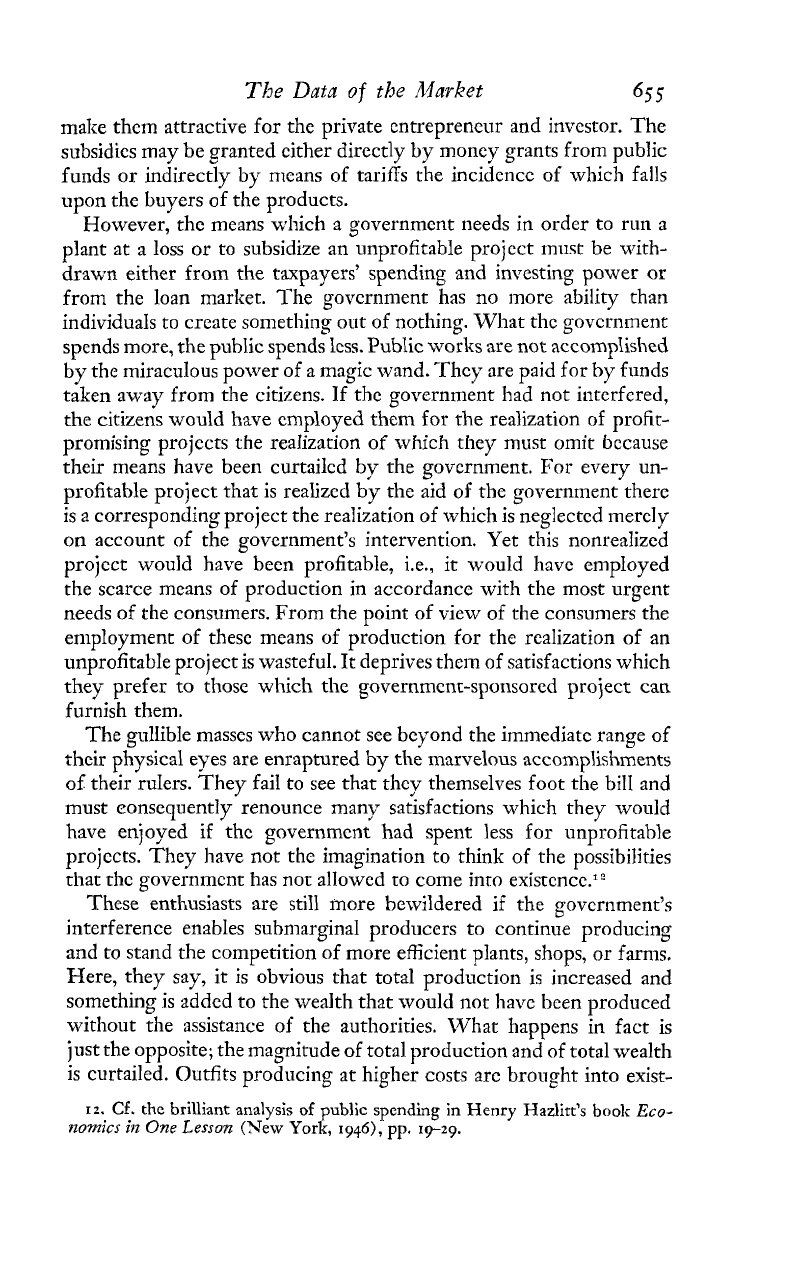
The Data
of
the
Market
65
5
make them attractive for the private entrepreneur and investor. The
subsidies may be granted either directly by money grants from public
funds or indirectly by means of tariffs the incidcncc of which falls
upon the buyers of the products.
However, the means which a government needs in order to run a
plant at a loss or to subsidize an unprofitable project must be with-
drawn either from the taxpayers' spending and investing power or
from the loan market. The government has no more ability than
individuals to create something out of nothing. What the govcrnment
spends more, the public spends Icss. Public works are not accomplished
by the miraculous power of a magic wand. Thcy are paid for by funds
taken away from the citizens. If the government had not intcrfcred,
the citizens would have employed thcm for the realization of profit-
promising projccts the realization of which they must omit because
their means have been curtailcd by the government. For every un-
profitable project that is realized by the
aid
of
the government there
is a corresponding project the realization of which is neglected inercly
on account of the govcrnment's intervention. Yet this nonrealized
projcct would have been profitable, i.e., it would have employed
the scarce means of production in accordance with the most urgent
needs of the consumers. From the point of view of the consumers the
employment of these means of production for the realization of an
unprofitable project is wasteful. It deprives thein of satisfactions which
they prefer to those which the governmenc-sponsored project can
furnish them.
The gullible masses who cannot see beyond the immediate range of
their physical eyes are enraptured by the marvelous accomplishments
of their rulers. They fail to see that they themselves foot the
bilI
and
must consequently renounce many satisfactions which they would
have enjoyed
if
the governmcnt had spent less for unprofitable
projects. They have not the imagination to think of the possibilities
that the governmcnt has not allowed to come into exist~ncc.~~
Thcse enthusiasts are still more bewildered
if
the government's
interference enables submarginal producers to continue producing
and to stand the competition of more efficient plants, shops, or farms.
Here, they say, it is obvious that total production is increased and
something is added to the wealth that would not have been produced
without the assistance of the authorities. What happens in fact is
just the opposite; the magnitude of total production and of total wealth
is curtailed. Outfits producing at higher costs are brought into exist-
I
2.
Cf.
the
brilliant analysis
of
public
spending
in
Henry
Hazlitt's
book
Eco-
nomics in
One
Lesson
(New
York,
ly46),
pp.
19-29.
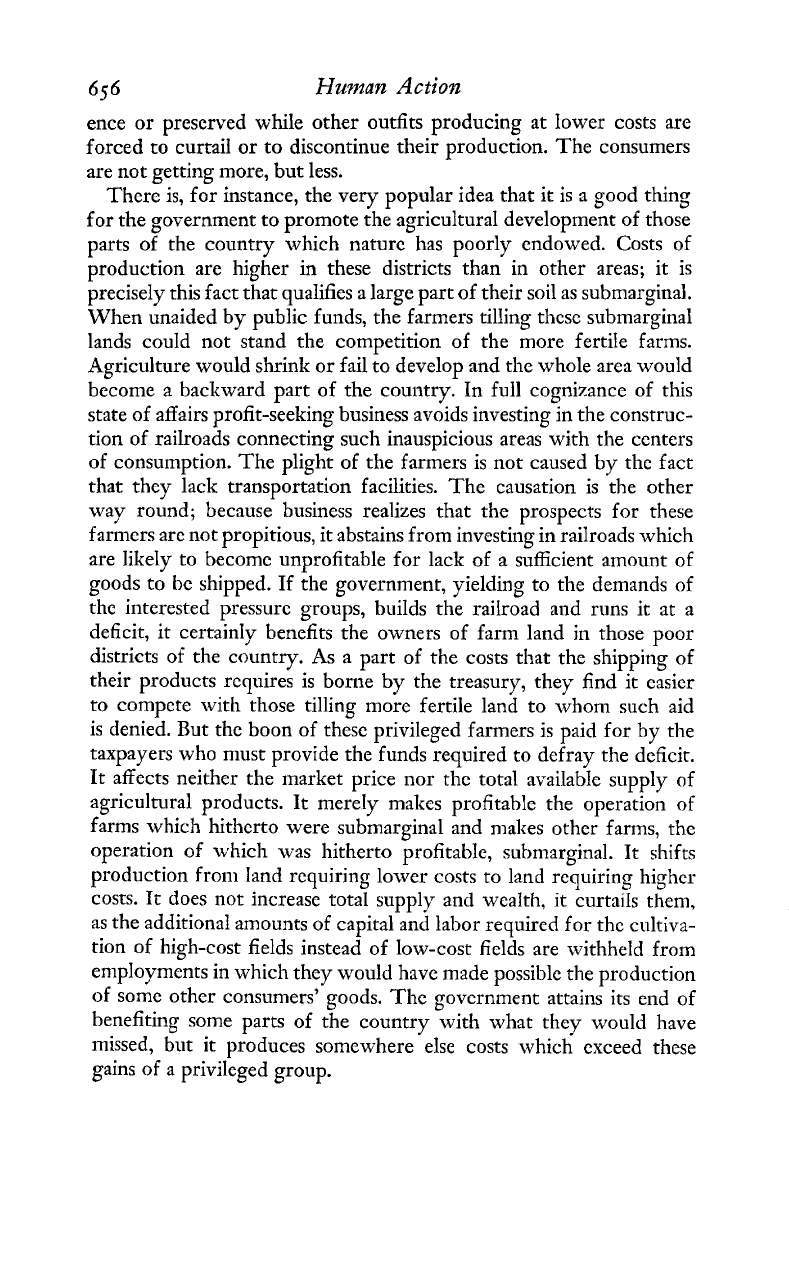
656
Human
Action
ence or preserved while other outfits producing at Iower costs are
forced to curtail or to discontinue their production. The consumers
are not getting more, but less.
There is, for instance, the very popular idea that it is a good thing
for the government to promote the agricultural development of those
parts of the country which nature has poorly endowed. Costs of
production are higher in these districts than in other areas; it is
precisely this fact that qualifies a large part of their soil as submarginal.
When unaided by public funds, the farmers tilling these submarginal
lands could not stand the competition of the more fertile farms.
Agriculture would shrink or fail to develop and the whole area would
become a backward part of the country. In full cognizance of this
state of affairs profit-seeking business avoids investing in the construc-
tion of railroads connecting such inauspicious areas with the centers
of consumption. The plight of the farmers is not caused
by
the fact
that they lack transportation facilities. The causation is the other
way round; because business realizes that the prospects for these
farmcrs are not propitious,
it
abstains from investing in railroads which
are likely to become unprofitable for lack of a sufficient amount of
goods to be shipped. If the government, yielding to the demands of
the interested pressure groups, builds the railroad and runs it at a
deficit, it certainly benefits the owners of farm land in those poor
districts of the country. As a part of the costs that the shipping of
their products requires is borne by the treasury, they find it easier
to compete with those tilling more fertile land to whom such aid
is denied. But the boon of these privileged farmers is paid for by the
taxpayers who must provide the funds required to defray the deficit.
It affects neither the market price nor the total available supply
of
agricultural products. It merely makes profitable the operation of
farms which hitherto were submarginal and makes other farms, the
operation of which was hitherto profitable, submarginal. It shifts
production from land requiring lower costs to land requiring higher
costs.
it
does not increase totai suppiy and weaith, it curtalis them,
as the additional amounts of capital and labor required for the cultiva-
tion of high-cost fields instead of low-cost fields are withheld from
enlploymcnts in which they would have made possible the production
of some other consumers' goods. The government attains its end of
benefiting some parts of the country with what they would have
missed, but it produces somewhere else costs which exceed these
gains of a privileged group.
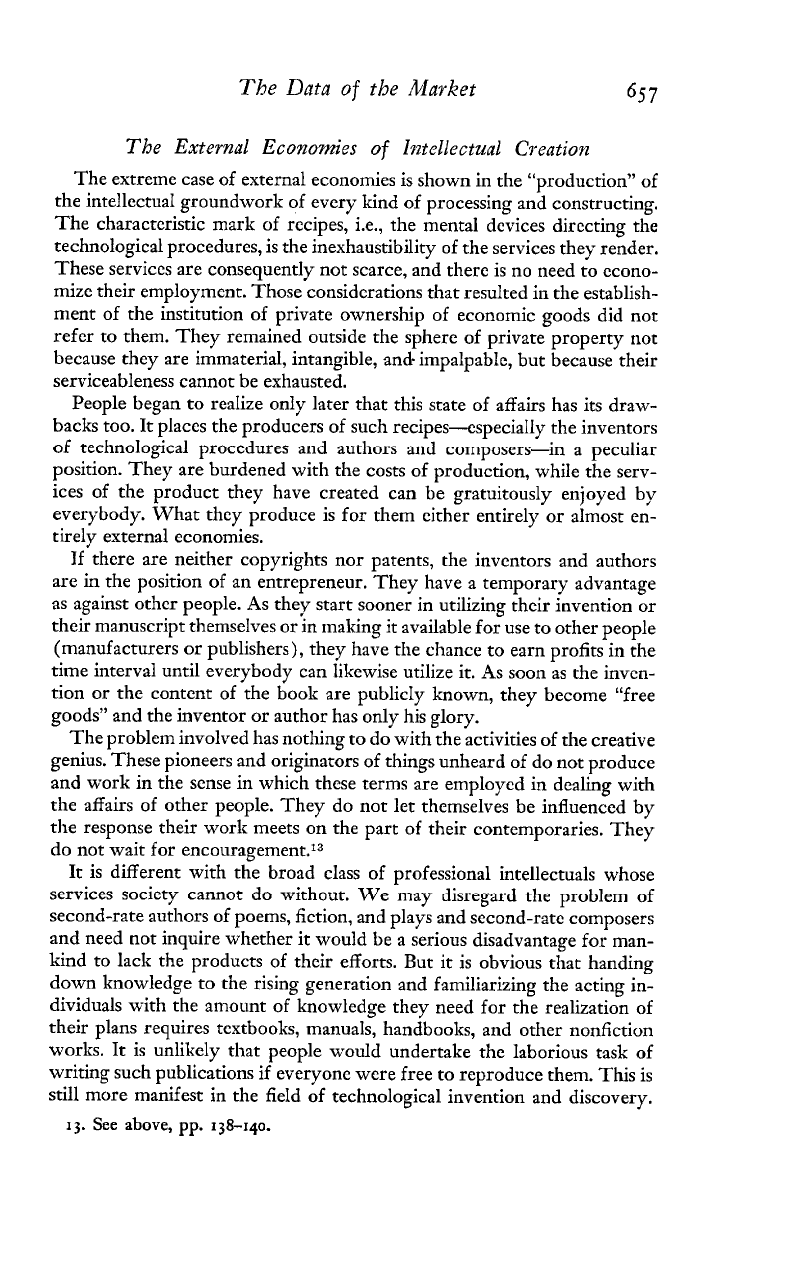
The Data
of
the
Market
The
Externlrl Economies of Intellectual Creation
The extreme case of external economies is shown in the "production" of
the intellectua1 groundwork of every kind of processing and constructing.
The characteristic mark of recipes, i.e., the mental devices directing the
technological procedures, is the inexhaustibility of the services they render.
These services are consequently not scarce, and there is no need to econo-
mize their employment. Those considerations that resulted in the establish-
ment of the institution of private ownership of economic goods did not
refer to them. They remained outside the sphere of private property not
because they are immaterial, intangible, and- impalpable, but because their
serviceableness cannot be exhausted.
People began to realize only later that this state of affairs has its draw-
backs too. It places the producers of such recipes--cspeciaIly the inventors
of
technological procedures and authors and composers-in
a
peculiar
position. They are burdened with the costs of production, while the serv-
ices of the product they have created can be gratuitously enjoyed by
everybody. What they produce is for them either entirely or almost en-
tirely external economies.
If there are neither copyrights nor patents, the inventors and authors
are in the position of an entrepreneur. They have a temporary advantage
as against other people. As they start sooner in utilizing their invention or
their manuscript themselves or in making it available for use to other people
(manufacturers or publishers), they have the chance to earn profits in the
time interval until everybody can likewise utilize it. As soon as the inven-
tion or the content of the book are publicIy known, they become "free
goods" and the inventor or author has only his glory.
The problem involved has nothing to do with the activities of the creative
genius. These pioneers and originators of things unheard of do not produce
and work in the sense in which these terms are employed in dealing with
the affairs of other people. They do not let themselves be influenced by
the response their work meets on the part of their contemporaries. They
do not wait for encouragement.13
It is different with the broad class of professional intellectuals whose
scrvices
socicq-
caiiiiot
do
withotit
'iVe
may disregard
the
of
second-rate authors of poems, fiction, and plays and second-rate composers
and need not inquire whether it would be a serious disadvantage for man-
kind to lack the products of their efforts. But it is obvious that handing
down knowledge to the rising generation and familiarizing the acting in-
dividuals with the amount of knowledge they need for the realization of
their plans requires textbooks, manuals, handbooks, and other nonfiction
works. It is unlikely that people would undertake the laborious task of
writing such publications if everyone were free to reproduce them. This is
still more manifest in the field of technological invention and discovery.
13.
See
above,
pp.
138-140.
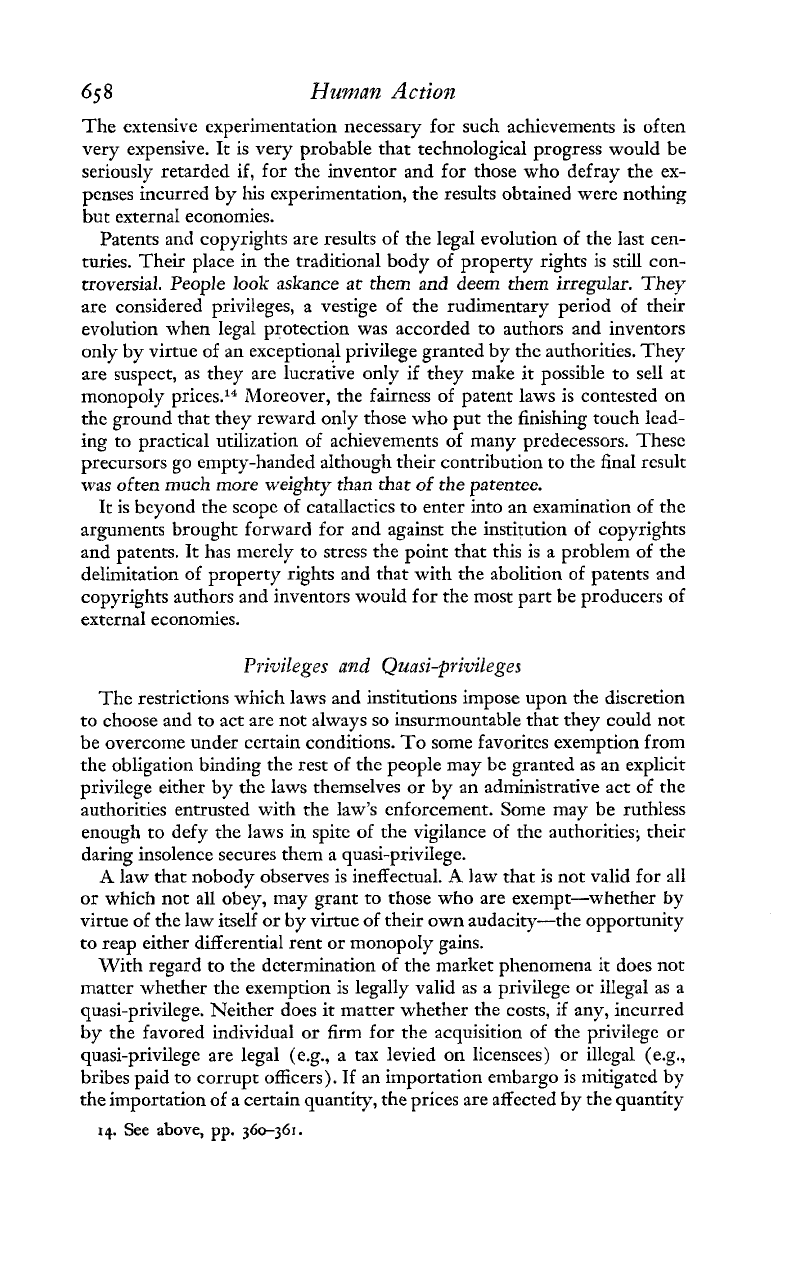
693
Human
Action
The extensive experimentation necessary for such achievements is often
very expensive. It is very probable that technological progress would be
seriously retarded if, for the inventor and for those who defray the ex-
penses incurred by his experimentation, the results obtained were nothing
but externaI economies.
Patents and copyrights are results of the legal evolution of the last cen-
turies. Their place in the traditional body of property rights is still con-
troversial. People
look
askance at them and deem them irregular.
They
are considered privileges, a vestige of the rudimentary period of their
evolution when legal protection was accorded to authors and inventors
only by virtue of an exceptional privilege granted by the authorities. They
are suspect, as they arc lucrative only if they make it possible to sell at
monopoly prices.14 Moreover, the fairness of patent laws is contested on
the ground that they reward only those who put the finishing touch lead-
ing to practical utilization of achievements of many predecessors. These
precursors go empty-handed although their contribution to the final result
was often much more weighty than that
of
the patentee.
It is beyond the scope of catallactics to enter into an examination of the
arguments brought forward for and against the institution of copyrights
and patents. It has merely to stress the point that this is
a
problem of the
delimitation of property rights and that with the abolition of patents and
copyrights authors and inventors would for the most part be producers of
external economies.
Privileges
and
Quasi-privileges
The restrictions which laws and institutions impose upon the discretion
to choose and to act arc not always so insurmountable that they could not
be overcome under certain conditions. To some favorites exemption from
the obligation binding the rest of the people may be granted as an explicit
privilege either by the laws themselves or by an administrative act of the
authorities entrusted with the law's enforcement. Some may be ruthIess
enough to defy the laws in spite of the vigilance of the authorities; their
daring insolence secures them a quasi-privilege.
A
law that nobody observes is ineffectual.
A
law that is not valid for all
or which not all obey, may grant to those who are exempt-whether by
virtue of the law itself or by virtue of their own audacity-the opportunity
to reap either differential rent or monopoly gains.
With regard to the determination of the market phenomena it does not
matter whether the exemption is legally valid as a privilege or illegal as a
quasi-privilege. Neither does
it
matter whether the costs, if any, incurred
by
the favored individual or firm for the acquisition of the privilege or
quasi-privilege are legal (e.g., a tax levied on licensees) or illegal (e.g.,
bribes paid to corrupt officers). If an importation embargo is
mitigated
by
the importation of a certain quantity, the prices are affected by the quantity
14.
See above,
pp.
360-361.
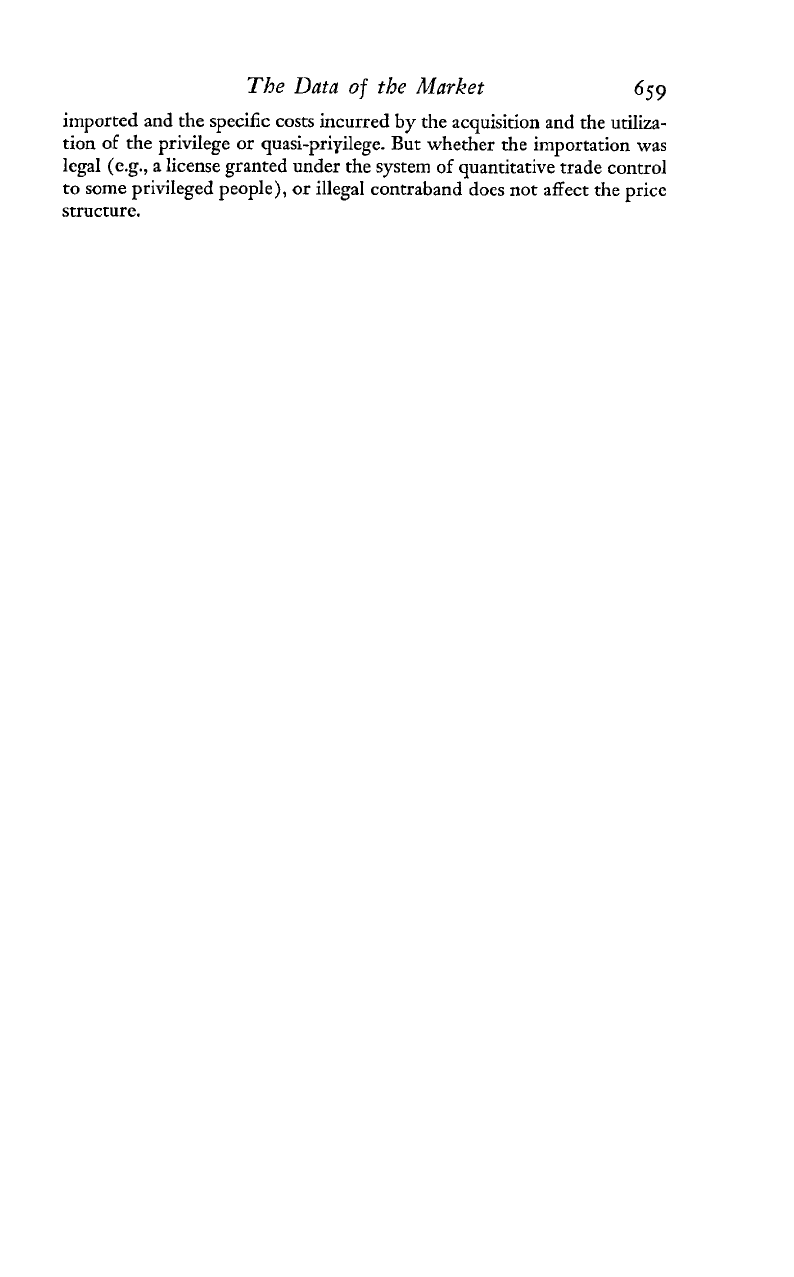
The Data
of
the
Market
659
imported and the specific costs incurred by the acquisition and the utiliza-
tion of the privilege or quasi-priyilege. But whether the importation
was
legal (e.g., a license granted under the system
of
quantitative trade control
to some privileged people), or illegal contraband does not affect the price
structure.
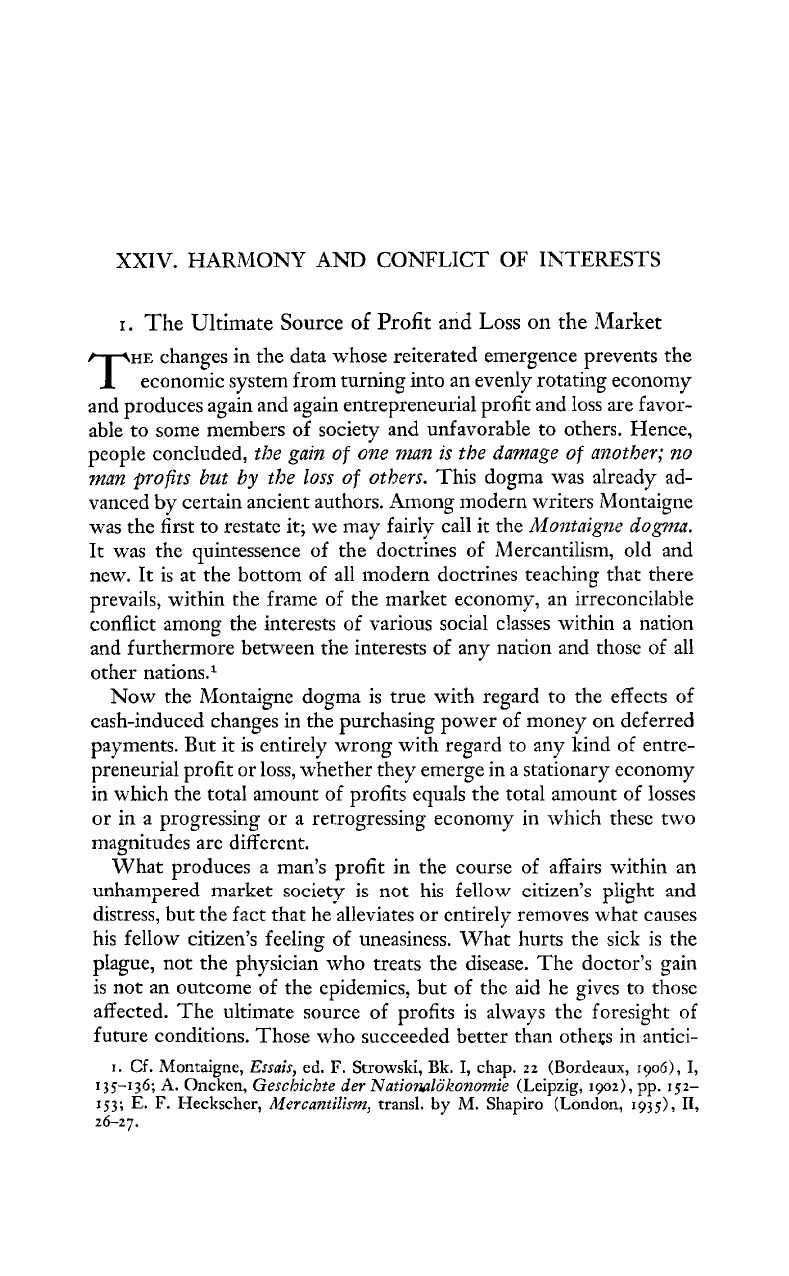
XXIV. HARMONY
AND
CONFLICT OF INTERESTS
I.
The Ultimate Source
of
Profit and Loss on the Market
T
HE
changes in the data whose reiterated emergence prevents the
econoniic system from turning into an evenly rotating economy
and produces again and again entrepreneurial profit and loss are favor-
able to some members of society and unfavorable to others. Hence,
people concluded,
the gain of one
nzan
is the damage of another; no
man profits
but
by
the
loss
of others.
This dogma was already ad-
vanced by certain ancient authors. Among modern writers Montaigne
was the first to restate it; we may fairly call it the
Montnigne
dogma.
It was the quintessence of the doctrines of Mercantilism, old and
new. It is at the bottom of all modern doctrines teaching that there
prevails, within the frame of the market economy, an irreconcilable
conflict among the interests of various social classes within a nation
and furthermore between the interests of any nation and those of all
other nati0ns.l
Now the Montaigne dogma is true with regard to the effects of
cash-induced changes in the purchasing power of money on deferred
payments. But it is entirely wrong with regard to any kind of entre-
preneurial profit or loss, whether they emerge in a stationary economy
in which the total amount of profits equals the total amount of losses
or
in
a progressing or a retrogressing economy in which these two
magnitudes arc different.
What produces a man's profit in the course of affairs within an
i.lnh2mpere?.
m2&et
sgciery
is
figt
his
fe!!axJ.r
citizer?'s
nlinht
anrl
r-sU-
---
distress, but the fact that healleviates or entirely removes what causes
his fellow citizen's feeling of uneasiness. What hurts the sick
is
the
plague, not the physician who treats the disease. The doctor's gain
is not an outcome of the epidemics, but of the aid he gives to those
affected. The ultimate source of profits is always the foresight of
future conditions. Those who succeeded better than others in antici-
I.
Cf.
Montaigne,
Essais,
ed.
F.
Strowski, Bk.
I,
chap.
22
(Bordeaux,
19061,
I,
I
35-136;
A.
Onckcn,
Geschichte
der
Natiowlokonomie
(Leipzig,
1902)~
pp.
I
52-
153;
E.
F.
Heckscher,
hfercantilimz,
transl.
by
M.
Shapiro (London,
1g35),
11,
26-27.
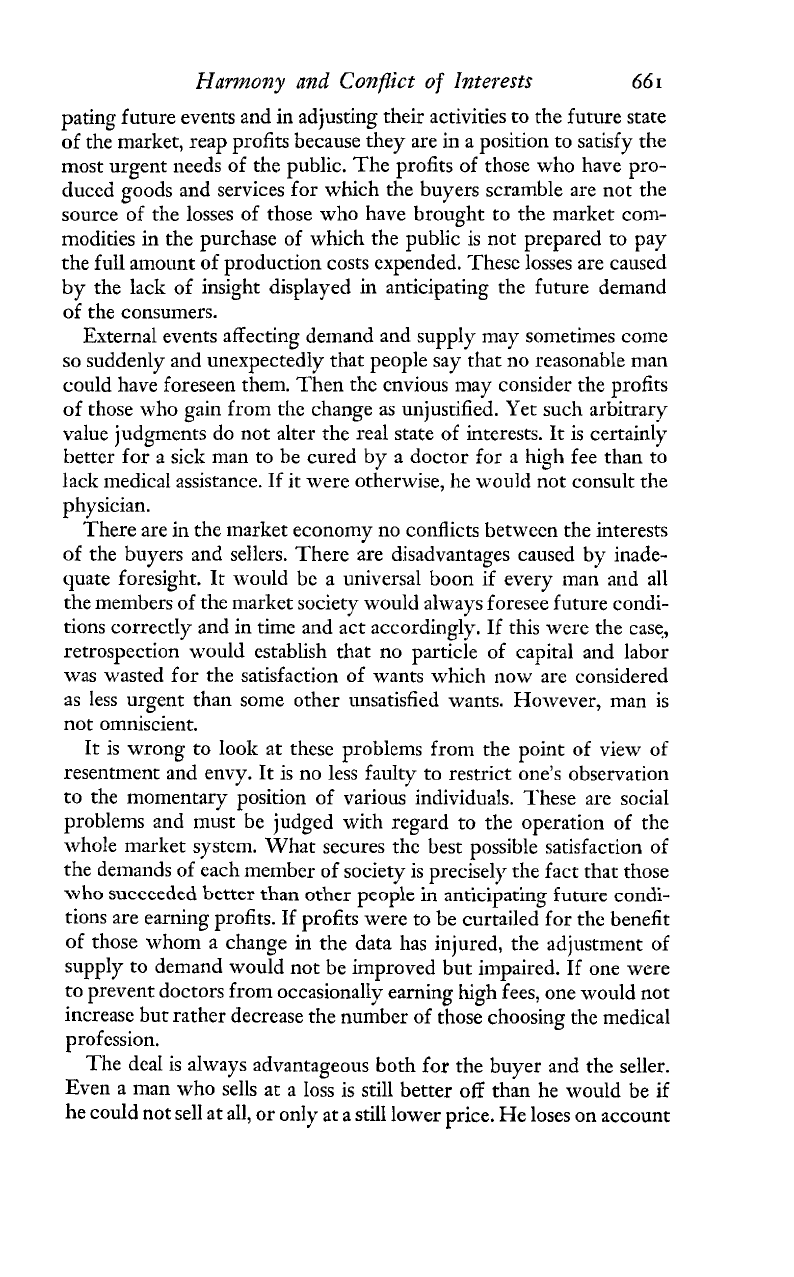
Harmony and Conflict of Inte~ests
66
I
pating future events and in adjusting their activities to the future state
of the market, reap profits because they are in a position to satisfy the
most urgent needs of the public. The profits
of
those who have pro-
duced goods and services for which the buyers scramble are not the
source of the losses of those who have brought to the market com-
modities in the purchase of which the public is not prepared to pay
the full amount of production costs expended. These losses are caused
by the lack of insight displayed in anticipating the future demand
of the consumers.
External events affecting demand and supply may sometimes come
so suddenly and unexpectedly that people say that no reasonable man
could have foreseen them. Then the envious may consider the profits
of those who gain from the change as unjustified. Yet such arbitrary
value judgments do not alter the real state of interests. It is certain$
better for a sick man to be cured by a doctor for
a
high fee than to
lack medical assistance. If it were otherwise, he would not consult the
physician.
There are in the market economy no conflicts between the interests
of the buyers and sellers. There are disadvantages caused by inade-
quate foresight. It would be a universal boon if every ma; and all
the members of the market society would always foresee future condi-
tions correctly and in time and act accordingly. If this were the case,
retrospection would establish that no particle of capital and labor
was wasted for the satisfaction of wants which now are considered
as less urgent than some other unsatisfied wants. However, man is
not omniscient.
It is wrong to look at these problems from the point of view of
resentment and envy. It is no less faulty to restrict one's observation
to the momentary position of various individuals. These are social
problems and must be judged with regard to the operation of the
whole market system. What secures the best possible satisfaction of
the demands of each member of society is precisely the fact that those
who succeeded better than other people
in
anticipating future condi-
tions are earning profits. If profits were to be curtailed for the benefit
of those whom a change in the data has injured, the adjustment of
supply to demand would not be improved but impaired. If one were
to prevent doctors from occasionally earning high fees, one would not
increase but rather decrease the number of those choosing the medical
profession.
The deaI is always advantageous both for the buyer and the seller.
Even a man who sells at a Ioss is still better off than he would
be
if
he could not sell at all, or only at a still lower price. He loses on account
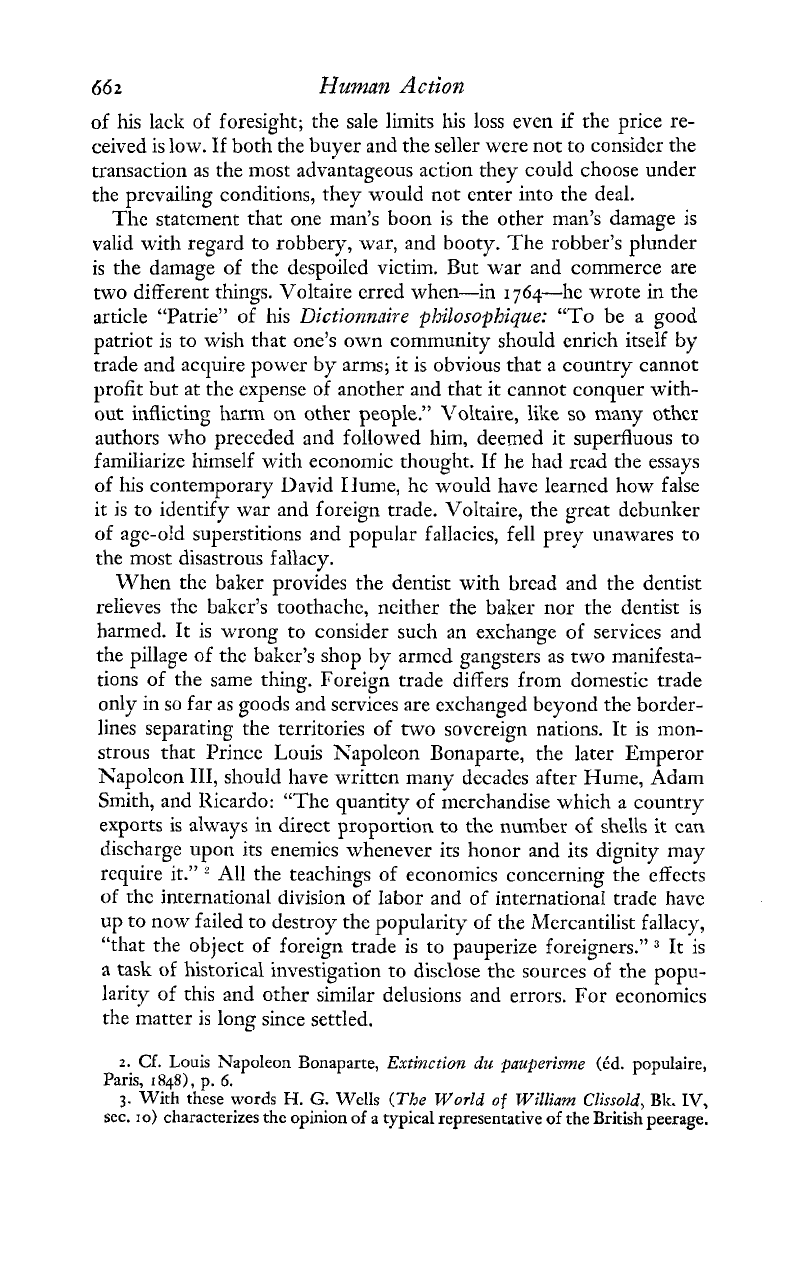
66
2
Human
Action
of his lack of foresight; the sale limits his loss even if rhe price re-
ceived is low. If both the buyer and the seller were not to consider the
transaction as the most advantageous action they could choose under
the prevailing conditions, they would not enter into the deal.
The statement that one man's boon is the other man's damage is
valid with regard to robbery, war, and booty. The robber's plunder
is the damage of the despoiled victim. But war and commerce are
two different things. Voltaire erred whcn-in
I
76+--hc wrote in the
article "Patrie" of his
Dictionmire philosophique:
"To be a good
patriot is to wish that onc's own
community
should enrich itself by
trade and acquire power by arms; it is obvious that a country cannot
profit but at the cxpense of another and that it cannot conquer with-
out
inflicting
harm
on other people." Voltaire, like
so
many
other
authors who preceded and followed him, deemed it superfluous to
familiarize himself with economic thought. If he had read the essays
of his contemporary David Ilume, he would have learned how false
it: is to idcntify war and foreign trade. VoItaire, the great debunker
of age-o!d superstitions and popular fallacics, fell prey unawares to
the most disastrous fallacy.
When the baker provides the dentist with bread and the dcntist
relieves rhe baker's toothache, neither the baker nor the dentist is
harmed. It is wrong to consider such an exchange of services and
the pillage of the baker's shop
by
armed gangsters as two manifesta-
tions of the same thing. Foreign trade differs from domestic trade
only in so far as goods and services are exchanged beyond the border-
lines separating the territories of two sovereign nations. It is mon-
strous that l'rince Louis Kapoleon Bonaparte, the later Ernperor
Napoleon 111, should have writtcn many decades after Hume, Adam
Smith, and Ricardo: "The quantity of
merchandise
which a country
exports is always in direct proportion to the number
of
shells it
can
discharge upon its enemics whenever its honor and its dignity may
require it."
'
All the teachings of economics concerning the effects
of the international division of labor and of international trade have
up
to now failed to destroy the popularity of the Mercantilist fallacy,
"that the object of forcign trade is to pauperize foreigners." It is
a task of historical investigation to disclose the sources of the popu-
larity of this and other similar delusions and errors. For economics
the matter is long since settled.
2.
Cf.
Louis Napoleon Bonaparte,
Extinction
dzc pauperisme
(6d.
populaire,
Paris,
I
848),
p.
6.
3.
With these words
H.
G.
Wells
(The World
of
William Clissold,
Bk.
IV,
sec.
10)
characterizes the opinion of a typical representative
of
the British peerage.
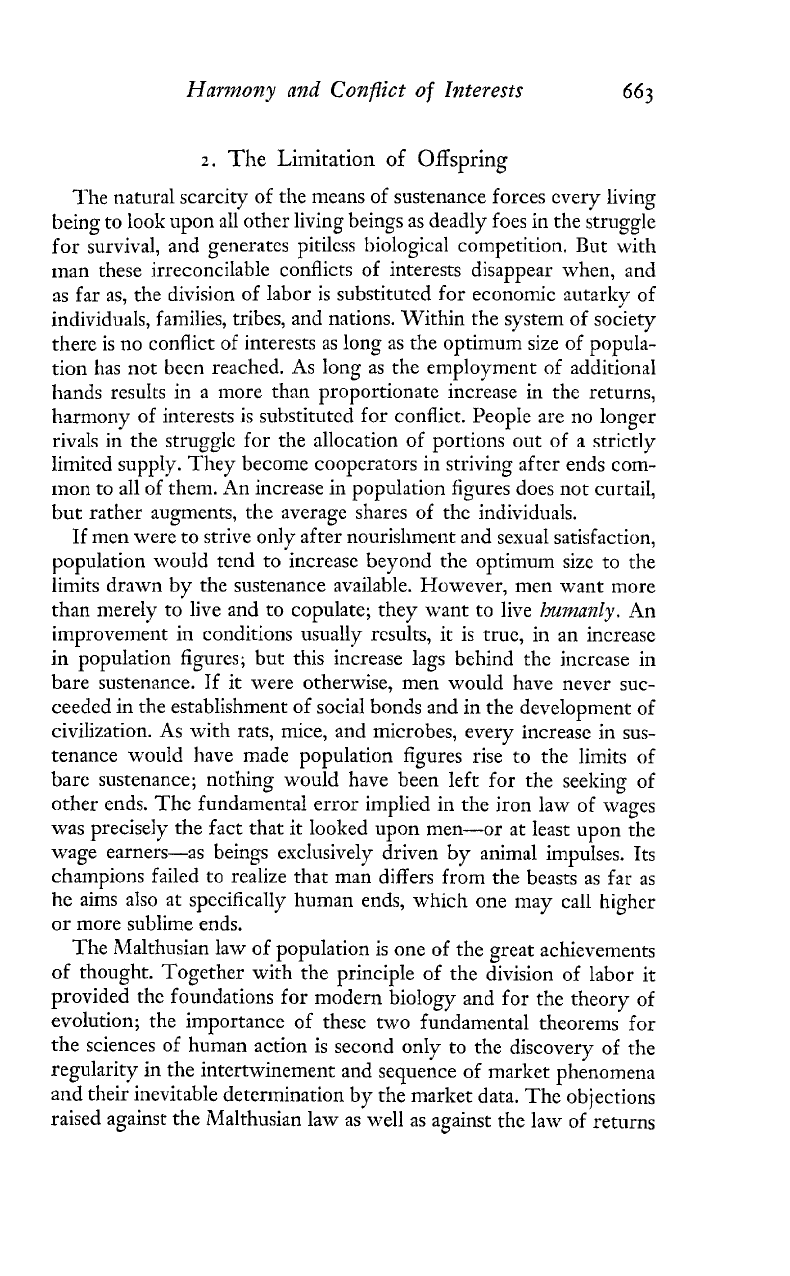
Har~nony
and
Conflict
of
lnterests
2.
The
Limitation
of
Offspring
The natural scarcity of the means of sustenance forces every living
being to look upon all other living beings as deadly foes in the struggle
for survival, and generates pitiless biological competition. Rut with
Inan these irreconcilable conflicts of interests disappear when, and
as far as, the division of labor is substituted for economic autarky of
individuals, families, tribes, and nations. Within the system of society
there is no conflict of interests as long as the optimum size of popula-
tion has not been reached. As long as the employment of additional
hands resuIts in a more than proportionate increase in the returns,
harmony of interests is substituted for conflict. People are no longer
rivals in the struggle for the allocation of portions out of a strictly
limited supply. They become cooperators in striving after ends com-
mon to all of them. An increase in population figures does not curtail,
but
rather augments, the average shares of the individuals.
If men were to strive only after nourishment and sexuaI satisfaction,
population wo~lld tend to increase beyond the optimum size to the
limits drawn by the sustenance available. However, men want more
than merely to live and to copulate; they want to live
humanly.
An
improvement in conditions usually results, it is true, in an increase
in population figures; but this increase lags bchind the increase in
bare sustenance. If it were otherwise, men would have never suc-
ceeded in the establishment of social bonds and in the development of
civilization. As with rats, mice, and microbes, every increase in sus-
tenance would have made population figures rise to the limits of
bare sustenance; nothing would have been left for the seeking of
other ends. The fundamental error implied
in
the iron law of wages
was precisely the fact that it looked upon men-or at least upon the
wage earners-as beings exclusively driven by animal impulses. Its
champions failed to rcalize that man differs from the beasts as far as
he aims aiso at specificaiiy human ends, whlch one may call higher
or more sublime ends.
The Malthusian law of population is one of the great achievements
of thought. Together with the principle of the division of labor it
provided the foundations for modern biology and for the theory of
evolution; the importance of these two fundamental theorems for
the sciences of human action is second only to the discovery of the
regularity in the intertwinement and sequence of market phenomena
and their inevitable determination by the market data. The objections
raised against the Malthusian law as well as against the law of returns
